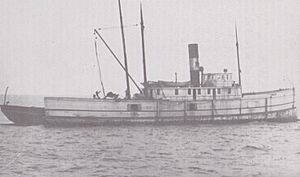Ottawa (tug) facts for kids

The Ottawa
|
|
Quick facts for kids History |
|
|---|---|
| Name | Ottawa |
| Owner | Reid Wrecking Company, of Sarnia, Ontario (last owners) |
| Port of registry | |
| Builder | Built in 1881 at Chicago |
| Laid down | November 13, 1909 |
| Launched | 1881 |
| Fate | Burned and sank 29 November 1909 |
| Status | Added to the National Register of Historic Places in 1992 |
| Notes | Wreck located between Basswood Island and the Bayfield Peninsula |
| General characteristics | |
| Type | Tugboat |
| Tonnage | 610.8 gross tons |
| Length | 151 feet (46 m) |
| Beam | 28 feet |
| Depth of hold | 13 feet |
| Installed power | 600 horsepower engine |
| Notes | Originally named the Boscobel, renamed Ottawa when sold. |
|
|
|
| Nearest city | Russell, Wisconsin |
| MPS | Great Lakes Shipwreck Sites of Wisconsin MPS |
| NRHP reference No. | 92000594 |
| Added to NRHP | June 8, 1992 |
The Ottawa was a powerful tugboat that sank in Lake Superior. Its wreckage lies off the coast of Russell, Bayfield County, Wisconsin. In 1992, the site was added to the National Register of Historic Places. This means it's an important historical place.
Contents
History of the Ottawa Tugboat
The Ottawa was first built in 1881 in Chicago, Illinois. Its original name was Boscobel. At the time, it was the biggest tugboat ever made in Chicago. It stayed the largest and strongest tug on the Great Lakes until it sank in 1909.
Early Life and New Name
The Boscobel was first used to move large groups of logs, called log rafts, across Lake Michigan. In 1901, the Reid Wrecking Company bought the tugboat. This company was based in Sarnia, Ontario. When they bought it, they changed its name to Ottawa.
The Final Rescue Mission
On November 13, 1909, a steamboat got stuck on a shallow area called a shoal. This happened during a storm near the Apostle Islands in Lake Superior. The steamboat was about two miles from Outer Island. The first mate and some crew members used a lifeboat to go ashore and get help.
For a week, four other ships tried to help the stranded steamboat. Finally, three more vessels, including the Ottawa, were sent to the scene. On November 29, they successfully freed the steamboat.
The Fire and Sinking
That evening, the crew of the Ottawa ate dinner and went to bed. Less than 30 minutes later, they woke up to a fire that was already very big. Other ships quickly pushed the Ottawa away from the steamboat it had just rescued. This was to stop the fire from spreading to other vessels. Another tugboat was sent to help the burning Ottawa.
Despite everyone's efforts, the Ottawa burned down to the waterline. It then sank into Lake Superior. Luckily, all the crew members on board were saved.
The exact reason for the fire is still a mystery. One idea is that the fire started on its own in the ship's coal bunkers. These bunkers held 130 tons of coal, which could have caught fire by itself.

